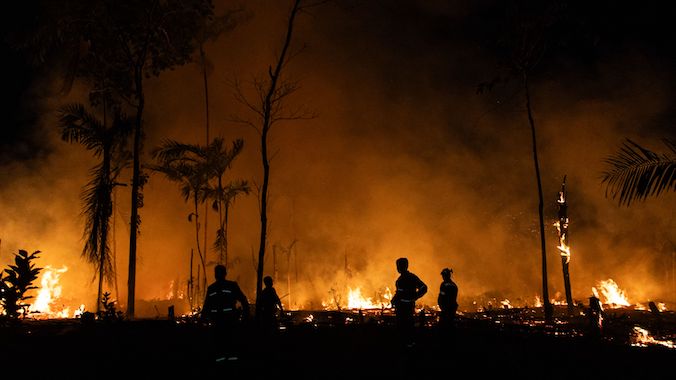Nobody is Wrong in Climate Change’s Doom Versus Hope Debate
Photo by Raphael Alves/EPA-EFE/Shutterstock
The U.K.-based climate think tank Ember released its Global Electricity Review 2024 on Wednesday, and it was filled with good news. The world generated 30 percent of its electricity from renewable sources last year, for one. “With record construction of solar and wind in 2023, a new era of falling fossil generation is imminent,” its authors wrote, calling 2023 a “pivot point” where power sector emissions likely peaked.
Also on Wednesday, The Guardian published a huge survey of almost 400 climate scientists from around the world, which asked them to weigh in on how much warming we are likely to see this century: 77 percent said at least 2.5 degrees Celsius, well beyond the 1.5 or 2.0 degree targets set out in the Paris Agreement, and almost none believe we could still keep 1.5 alive. The planet has already warmed at least 1.2 degrees C, and the impacts are already devastating; 2.5 degrees will be catastrophic.
Accompanying that survey was a piece that just asked how the climate scientists feel about, well, everything. The short version is that they’re not doing great! One scientist said it’s hard not to feel “hopeless and broken.” Another finds it “infuriating, distressing, overwhelming.” Another said they are happy to not have children, “knowing what the future holds.”
-

-

-

-

-

-

-

-

-

-

-

-

-

-

-

-

-

-

-

-

-

-

-

-

-

-

-

-

-

-

-

-

-

-

-

-

-

-

-

-

-

-

-

-

-

-

-

-

-

-

-

-

-

-

-

-

-

-

-

-

-

-

-

-

-

-

-

-

-

-

-

-

-

-

-

-

-

-

-

-

-

-

-

-

-

-

-

-

-

-

-

-

-

-

-

-

-

-

-

-

-

-

-

-

-

-

-

-












































































































